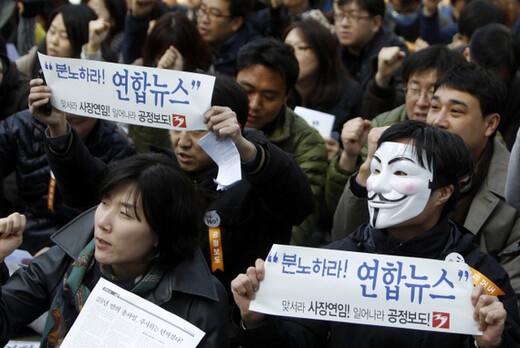hankyoreh
Links to other country sites 다른 나라 사이트 링크
[Editorial]Conflict of interest at Yonhap boils over into strike

Yonhap News Agency’s labor union launched a strike yesterday calling for a return to fair reporting and the non-renewal of Park Jung-chan’s term as president. The decision to strike was strongly supported, with 471 out of 504 union members taking part in the vote and 396 of them, or 84.1%, voting in favor. This comes 23 years after the agency‘s last strike, a 1989 action demanding a multiple recommendation system for managing editors.
Yonhap News reporters laid down their pens and microphones due to an outpouring of the anger that has built up over time with reporting biased in favor the Lee Myung-bak administration, worsening labor conditions after the launch of the broadcast news channel News Y, and the deterioration of democracy within the agency. The union is reflecting on its shameful conduct under Park Jung-chan and asking for forgiveness and trust from the South Korean public through a strike bulletin titled “Our Distorted Self-Portrait”. In it, a union member shamefully recalls, “An article I wrote got a reply calling me a ’Yonhap hack.‘ I’m not a Yonhap hack. I work at Yonhap News.” The main impetus for the strike at Yonhap News is a desire to erase the “hack” stain.
The Yonhap News described by the union is a far cry from the “proper media, fast communication” described in its motto. After an article on the trial of former Prime Minister Han Myeong-sook ended up severely distorted following revisions by editorial department officials, the reporter went to the legal team, refusing to put his by-line on it. A special feature article on the Four Major Rivers Project was unalloyed propaganda, with its references to “a South Han River where otters and cranes will live together” and “recovering Baekje culture through restoration of the Geum River.” It also shied away from investigating allegations about President Lee‘s proposed retirement residence in Seoul’s Naegok neighborhood, focusing instead on offering an explanation for it.
Yonhap is South Korea’s largest news agency and is publicly funded. It supplies news not only to South Korean networks, newspapers, governments, and portal sites but also to contracted media overseas. A strike there will inevitably have a significant impact on news production at local newspapers and many other media outlets. Now that it is clear how the agency’s members feel, Park should make a wise determination.
There also needs to be a reexamination of the agency’s financial situation going ahead. Right now, Yonhap receives government support in the form of subscription fees based on the Act on Promotion of News Communications, amounting to 35.4 billion won (about $31.5 billion US) this year. The goal here may be to ensure the agency’s financial stability, but it also leaves a lot of room for government interference. Such an arrangement leaves it hard-pressed not to take the government’s wishes into account.
Please direct questions or comments to [englishhani@hani.co.kr]
Editorial・opinion
![[Column] Is Korean democracy really regressing? [Column] Is Korean democracy really regressing?](https://flexible.img.hani.co.kr/flexible/normal/500/300/imgdb/original/2024/0705/2917201664129137.jpg) [Column] Is Korean democracy really regressing?
[Column] Is Korean democracy really regressing?![[Column] How tragedy pervades weak links in Korean labor [Column] How tragedy pervades weak links in Korean labor](https://flexible.img.hani.co.kr/flexible/normal/500/300/imgdb/original/2024/0703/8717199957128458.jpg) [Column] How tragedy pervades weak links in Korean labor
[Column] How tragedy pervades weak links in Korean labor- [Column] How opposing war became a far-right policy
- [Editorial] Korea needs to adjust diplomatic course in preparation for a Trump comeback
- [Editorial] Silence won’t save Yoon
- [Column] The miscalculations that started the Korean War mustn’t be repeated
- [Correspondent’s column] China-Europe relations tested once more by EV war
- [Correspondent’s column] Who really created the new ‘axis of evil’?
- [Editorial] Exploiting foreign domestic workers won’t solve Korea’s birth rate problem
- [Column] Kim and Putin’s new world order
Most viewed articles
- 110 days of torture: Korean mental patient’s restraints only removed after death
- 2Months after outcry over “torture devices,” Justice Ministry proposes more restraints for immigratio
- 3Beleaguered economy could stymie Japan’s efforts to buoy the yen
- 4[Column] Is Korean democracy really regressing?
- 5Koreans are getting taller, but half of Korean men are now considered obese
- 6[Column] How tragedy pervades weak links in Korean labor
- 7Former bodyguard’s dark tale of marriage to Samsung royalty
- 8Real-life heroes of “A Taxi Driver” pass away without having reunited
- 9[Editorial] Exploiting foreign domestic workers won’t solve Korea’s birth rate problem
- 10Democrats ride wave of 1M signature petition for Yoon to be impeached